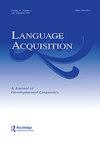Phonetic imitation in L2 speech: Immediate imitation of English consonant glottalization by speakers of Polish
IF 1.3
3区 文学
0 LANGUAGE & LINGUISTICS
引用次数: 0
Abstract
ABSTRACTPhonetic imitation is a ubiquitous process in speech production. Speakers have a strong tendency to imitate their interlocutors both in a native and a non-native language. It is especially important in acquiring non-native speech, because it allows forming new sound categories. In the current study we investigated whether and to what extent Polish learners of English are able to imitate t-glottalization observed especially in British English. A total of 25 Polish learners of English imitated English models’ productions with t-glottalization that were subsequently compared to their default productions (pre-test) and post-exposure production (post-test). The results showed that the participants successfully imitated t-glottalization after the exposure to the model talker. The generalization effect was limited in its magnitude in that only some of the non-imitated words had traces of glottalization. The results are discussed in terms of the differences in the implementation of glottalization in Polish and English and of how phonetic imitation informs second-language speech acquisition. Disclosure statementNo potential conflict of interest was reported by the authors.Data availability statementThe authors confirm that the data supporting the findings of this study are available within the article and its supplementary materials https://osf.io/p3zes/.Notes1 See Docherty & Foulkes (Citation1999) and Ashby & Przedlacka (Citation2014) for illustrations of glottal events in non-SSBE varieties of English. For glottalization in American English, see, for instance, Seyfarth & Garellek (Citation2020) or Kaźmierski (Citation2020).2 Interestingly, when we fit the data with a numeric dependent variable (0 or 1) using a standard lmer model with the same effect structure as before, the predicted means align with the observed means almost perfectly. P-values are generally higher now, and the significance of pairwise comparisons changes somewhat. There is now no significant difference between positions in T1 (p = 0.081), and the effects of task are altered for the comparison T1/T3 (in intervocalic position, the difference is no longer significant with p = 0.128, while in non-prevocalic position, there is now a significant difference with p = 0.006).Additional informationFundingResearch supported by the National Science Centre Poland grant Phonetic imitation in a native and non-native language (UMO-2019/35/B/HS2/02767) to the first author and by the funds granted under Research Excellence Initiative of the University of Silesia in Katowice.第二语言语音模仿:说波兰语的人立即模仿英语辅音的发音
语音模仿是语音产生过程中普遍存在的一个过程。说话者用母语和非母语都有模仿对话者的强烈倾向。这在学习非母语语言时尤为重要,因为它可以形成新的声音类别。在当前的研究中,我们调查了波兰英语学习者是否以及在多大程度上能够模仿在英国英语中观察到的t-glottalization。共有25名波兰英语学习者模仿英语模特的t-glottalization作品,随后将其与默认作品(前测试)和曝光后作品(后测试)进行比较。结果表明,被试在接触模特后成功地模仿了t- glotization。泛化效应的程度是有限的,因为只有一些非模仿的单词有发音化的痕迹。研究结果讨论了波兰语和英语在实现全球化方面的差异,以及语音模仿如何影响第二语言语音习得。披露声明作者未报告潜在的利益冲突。数据可用性声明作者确认,支持本研究结果的数据可在文章及其补充材料中获得https://osf.io/p3zes/.Notes1参见Docherty & Foulkes (Citation1999)和Ashby & Przedlacka (Citation2014)对非ssbe英语中声门事件的说明。关于美式英语中的全球化,例如,请参阅Seyfarth & Garellek (Citation2020)或Kaźmierski (Citation2020)有趣的是,当我们使用与之前相同的效应结构的标准lmer模型将数据与数字因变量(0或1)拟合时,预测的平均值与观察到的平均值几乎完全一致。现在p值普遍较高,两两比较的显著性有所变化。T1位置之间的差异不显著(p = 0.081), T1/T3的比较改变了任务的影响(在间歇位中,差异不再显著,p = 0.128,而在非间歇位中,差异显著,p = 0.006)。由波兰国家科学中心资助的研究向第一作者提供母语和非母语语音模仿(UMO-2019/35/B/HS2/02767),并由卡托维兹西里西亚大学卓越研究计划资助。
本文章由计算机程序翻译,如有差异,请以英文原文为准。
求助全文
约1分钟内获得全文
求助全文
来源期刊

Language Acquisition
Multiple-
CiteScore
2.30
自引率
8.30%
发文量
20
期刊介绍:
The research published in Language Acquisition: A Journal of Developmental Linguistics makes a clear contribution to linguistic theory by increasing our understanding of how language is acquired. The journal focuses on the acquisition of syntax, semantics, phonology, and morphology, and considers theoretical, experimental, and computational perspectives. Coverage includes solutions to the logical problem of language acquisition, as it arises for particular grammatical proposals; discussion of acquisition data relevant to current linguistic questions; and perspectives derived from theory-driven studies of second language acquisition, language-impaired speakers, and other domains of cognition.
 求助内容:
求助内容: 应助结果提醒方式:
应助结果提醒方式:


